
In this September issue we present at Parliament House, tackle stigma in healthcare, celebrate community health in Mount Druitt, welcome hepatitis B lived experience speakers and much more…
- Position available at Hepatitis NSW
- Parliament House: Liam speaks about peer workers and hep C elimination
- Hepatitis NSW’s PeerHub
- Tackling Stigma in Healthcare: Community voices from the Viral Hepatitis 2025 Conference
- Hepatitis B lived experience speakers
- EMPOWER at Mount Druitt Community Health Centre’s 50-year anniversary
- Practical aspects of setting up hep C interventions and models of care at INHSU Symposium 2025
- Hepatitis NSW AGM. Save the date!
- Birth dose hepatitis B vaccine is safe, effective and necessary
- Tx! MAG #46 coming soon
- What is an antibody?
- Beyond the C
Position available at Hepatitis NSW
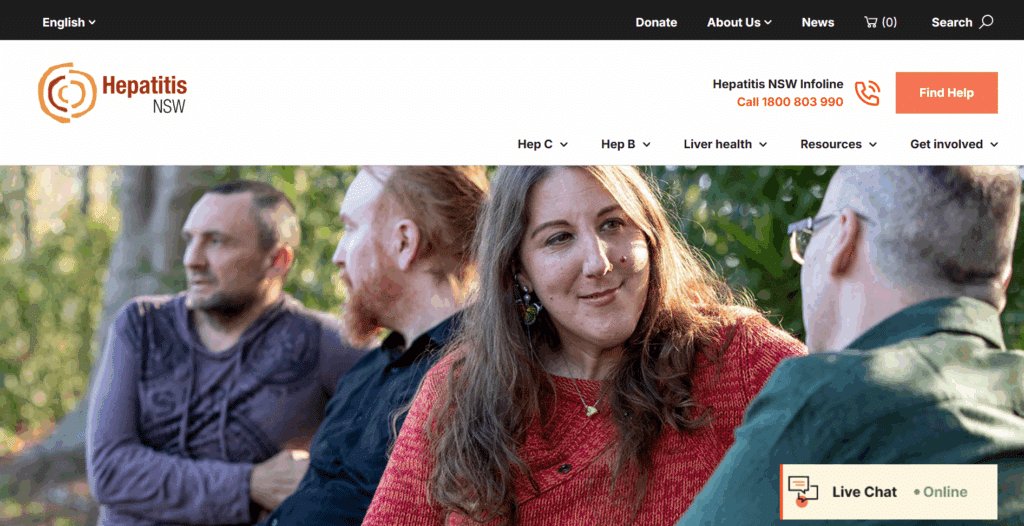
Hepatitis NSW is recruiting a Project Officer – Infoline, Speaker Program, and Hep Connect. Applications close 15th October 2025.
This is a fixed term role, 35 hours per week, to 30 June 2026 and will be joining the Priority Populations and Settings team.
The role involves primarily overseeing three distinct projects, namely the:
- Hepatitis Infoline – our valued telephone, online chat, and email service providing a primary point of contact and source of information, support, assistance, and referral on hepatitis for the affected community, health service providers, and the general public.
- Speaker Program – a long-established program employing people with lived experience of hepatitis B or C who share their personal story in a number of forums including online webinars, at conferences, and in workplace training sessions.
- Hep Connect Program – app-based treatment support service that provides encouragement and incentives to adhere to medication treatment and achieve cure in 8 – 12-weeks.
Details of the position and the job application pack can be found here.
Applications close 15th October 2025

Parliament House: Liam speaks about peer workers and hep C elimination
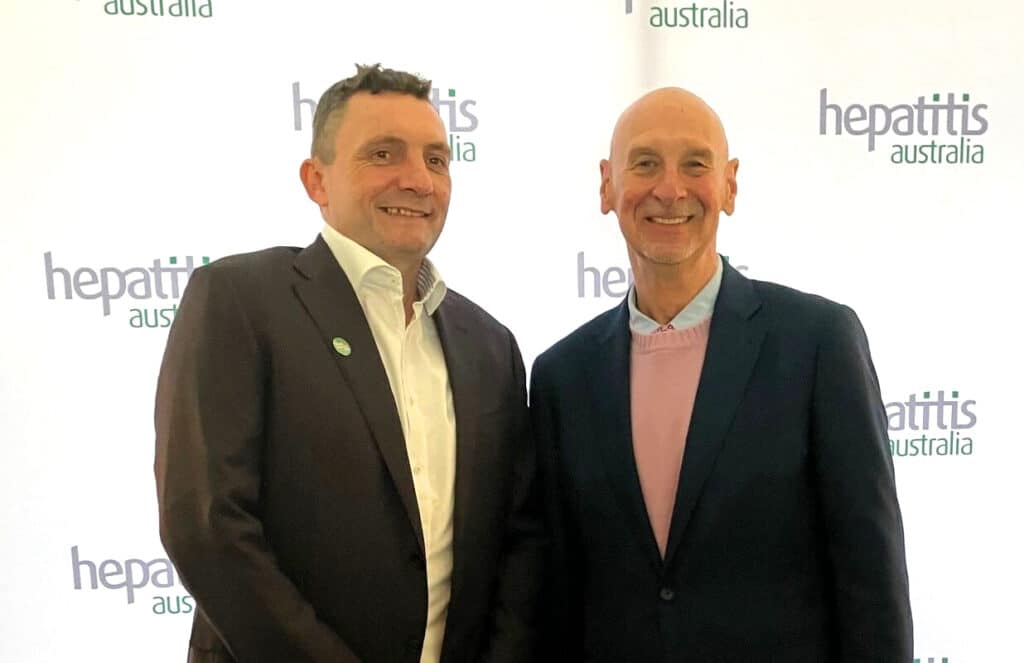
Liam, Hepatitis NSW’s Peer Programs Coordinator, spoke at the World Hepatitis Day event, hosted by Hepatitis Australia at Parliament House, Canberra on Tuesday 2 September 2025. He reports back on his experience.
The event was a great opportunity to hear from federal politicians, key stakeholders and sector champions. Chief Medical Officer Professor Michael Kidd AO gave an excellent speech about reducing stigma and person-centered care for all people.
I talked about the effectiveness of lived experience peers in providing non-stigmatising healthcare through the value of meeting people where they’re at, and how peers create bridges through redefined connection between community and health professionals increasing service uptake and removal of barriers.
Noting that peer workers are healthcare workers, the need for continual investment is clear, critical and ever present, as is developing a modern peer workforce with an increasing capacity to be involved in each part of the fight to eliminate viral hepatitis in Australia and having this as a prerequisite – something accepted and assumed, not resisted or dismissed.
This development needs greater attention on priority populations, requiring focused recruitment of peer workers who can provide culturally safe support, creation of prison-based peer initiatives, funding of anti-stigma campaigns with reach beyond those already involved and remuneration congruent to the specialised skills and services provided by peers.
Lived expertise is integral in the planning and implementation of policy and practice relative to all work being done in the viral hepatitis space and the potential of peer workers exists wholly in the opportunities provided to us. Career pathways cannot be limited to only speaking to or for our communities.
The difference between public heath targets and real-life elimination.
If we do not drive a narrative of 100% elimination, then those affected will be the same groups who are always left behind or excluded. All are someone’s loved one or friend, all have the right to be free from the burden of hep C.
Ending the fight at 90% proposes a potential growth in future demand for treatment, spikes in associated illness and death, along with increased costs to healthcare.
All the necessary pieces are in easy reach. WE CAN 100% achieve elimination. Let’s make history, so hep C in Australia is just that, history…
This article was written by Liam, Hepatitis NSW Peer Programs Coordinator, pictured here with Hepatitis NSW CEO, Steven.

Hepatitis NSW’s PeerHub
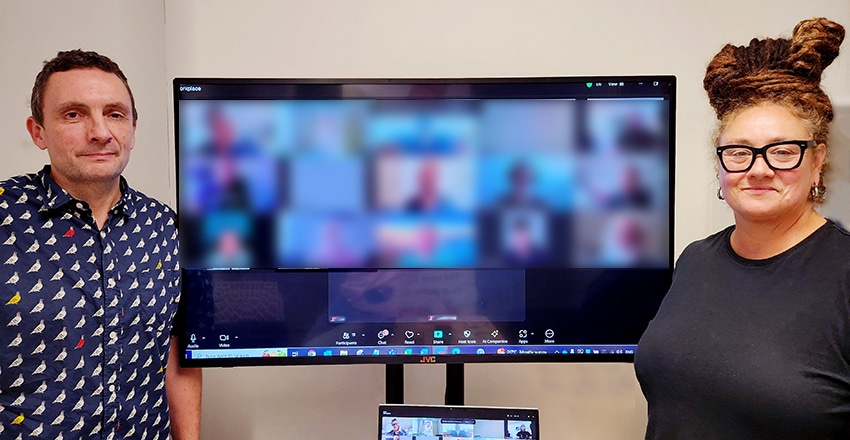
Hepatitis NSW’s PeerHub – an online Community of Practice for our lived experience peer workers – continues to provide an important and supportive space. Organised by the Peer Partnership Program team of Liam and JD, our peer workers from across the state are invited, and paid, to engage in this online space to discuss their experiences working with community and health partners, share the unique skills and tips they bring to being a lived experience healthcare practitioner, and to unpack the events – or sector developments – which are informing recent work.
Our most recent PeerHub, held in early August, had everyone celebrating their involvement in the highly successful HEP CURED ‘25 campaign. This year’s hepatitis C health promotion campaign saw an expanded number of events and opportunities for peer community engagement alongside clinical partners testing for hepatitis C.
As our Community of Practice becomes a regular event, the team has increasingly recognised PeerHub as a safe space where each person’s contribution and presence is of equal importance and interest.

Tackling Stigma in Healthcare: Community voices from the Viral Hepatitis 2025 Conference
After high levels of representative presentations from Hepatitis NSW at the Viral Hepatitis 2025 conference, Tackling Stigma in Healthcare published a selection of lived and living experience voices from the conference in its most recent newsletter. The Tackling Stigma in Healthcare initiative is headed by Professor Carla Treloar, a previous Hepatitis NSW Cheryl Burmann Award recipient,
One of the inclusions was “Lived Experience peer workers provide non-stigmatising healthcare”, the presentation given by Liam, coordinator of Hepatitis NSW’s Peer Partnership program. The program recently celebrated peer workers engaging with over 22,000 people in the community across NSW from 2017 to 2025.
You can read Liam’s article, along with the other publications from across Australia’s LLE community here:

Hepatitis B lived experience speakers

Please meet our newest wonderful lived experience speakers, Tam and Van. This duo first connected with Hepatitis NSW in 2023, starting their journey as multicultural health workers. Since then, they have successfully completed their training for our speaker program.
Both Tam and Van bring a wealth of community work experience and are leaders who are deeply connected to the Vietnamese community. We are excited to continue to improve our connections to the Vietnamese community and thrilled to have Tam and Van join our team to help us in our efforts. We look forward to working with, and for, the Vietnamese community to get the best information, support and advice about managing and living a healthy life with, hepatitis B.
Please extend a warm welcome to Tam and Van.

Empower at Mount Druitt Community Health Centre’s 50-year anniversary

Mount Druitt Community Heath Centre hosted its 50th anniversary party this month. Hepatitis NSW, other community organisations, and clinical partners were invited along to join the celebrations. Our EMPOWER team collaborated with The Storr Liver Clinic from Westmead Hospital to set up shop for what turned out to be a beautiful, busy day…and very successful. 53 tests were completed with Hepatitis NSW peer workers assisting in antibody point-of-care tests, and RNA test referrals, for those who needed it, to the staff from Storr Liver Clinic adjacent. In addition to the RNA referrals, Storr Liver Clinic provided hepatitis B testing and liver screening making it a wholly integrated care event. The day was a real hit with community members with free ice cream, sausage sizzle, and coffee along with many health and wellbeing stalls such as Child and Family Health, BreastScreen NSW, sexual health and many more.
Hepatitis NSW congratulates the Mount Druitt Community Health Centre on an awesome day and wishes staff and patients all the best for many more years to come!

Practical aspects of setting-up hep C interventions and models of care at INHSU Symposium 2025
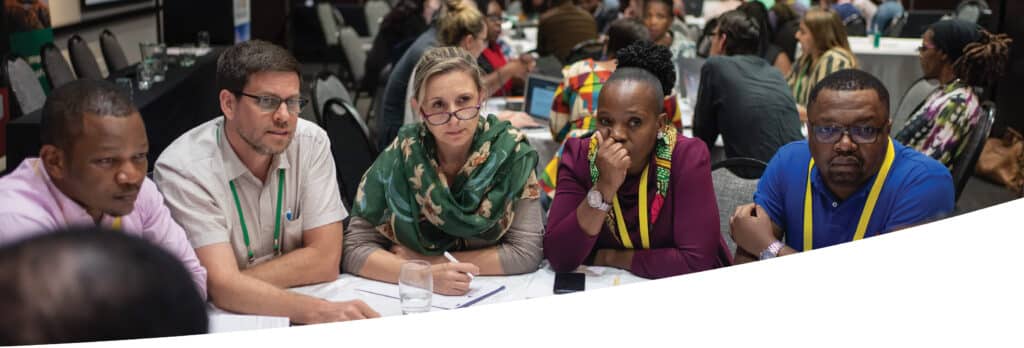
The International Network on Health and Hepatitis in Substance Users (INHSU) hosted the Hep C Intervention Symposium in Sydney on 4 September 2025. The Symposium brought together a stellar line-up of community workers, experts and practitioners leading hep C elimination efforts across to workshop and share insights on workforce development, practical aspects for successful hep C interventions and models of care, the key challenges and learnings to date, in a collaborative environment.
Hepatitis NSW was pleased to be one of INHSU’s collaborating organisations for the Symposium, which also included the Australasian Hepatology Association, AIVL (Australian Injecting & Illicit Drug Users League), NADA (Network of Alcohol and other Drugs Agencies), NUAA (NSW Users and AIDS Association). A local expert steering committee guided the development of the Symposium program., which include Hepatitis NSW and lived experience representatives.
One of the opening presentations from Maia, our Aboriginal Community Engagement project officer, framed the importance of delivering cultural safety in hep C care and why it matters. Maia spoke to the disproportionate impact of hep C on First Nations People, and the structural, historical factors contributing to their increased risk. Clinical yarning – creating a space where our mob feel seen, heard, and safe – was one of the patient-centred frameworks shared to improve communication in Aboriginal healthcare.
Hepatitis NSW’s peer advocate, Liam, continued this theme of cultural safety with a presentation about Language Competency in delivering care for hep C – referencing NADA/NUAA’s Language Matters best-practice guidelines for practitioners in health-settings on how to use empowering and destigmatising language when discussing alcohol and other drugs and the people who have or do use them.
Dr Phil Read (KRC Director) and Dr Thao Lam (Gastroenterologist) provided a comprehensive introduction into global and national hep C epidemiology, and outlined the interventions to enhance the care cascade, referencing various point-of-care models in INHSU’s Hepatitis C Intervention Toolkit.

Hepatitis NSW AGM. Save the date!
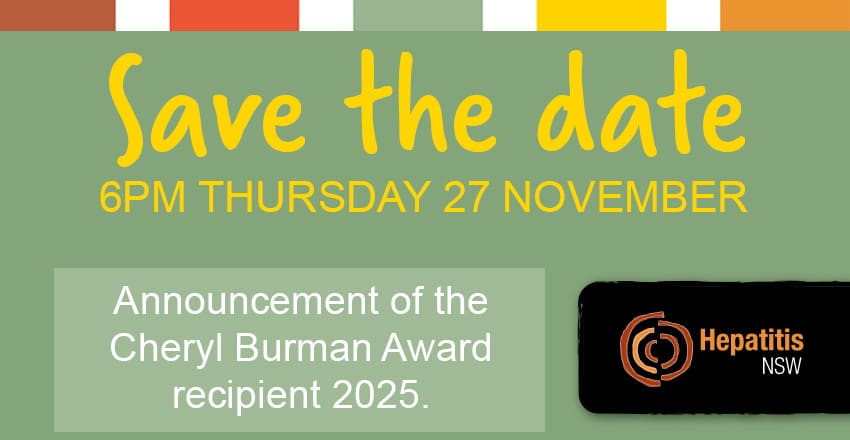
Members of Hepatitis NSW are invited to the Hepatitis NSW Annual General Meeting on Thursday 27 November. The event will include the announcement of the Cheryl Burman Award recipient.
Members will receive an invitation with more details.
If you live in NSW and would like to become a community member of Hepatitis NSW you can apply here. Membership is free for individuals – just click on the $0 button! We have memberships to suit individuals, professionals and organisations with great benefits. Plus, you’ll join the largest community of people in NSW working towards a world free of viral hepatitis!
Please phone our office if you have membership-related questions on 02 9332 1853.

Birth dose hepatitis B vaccine is safe, effective and necessary
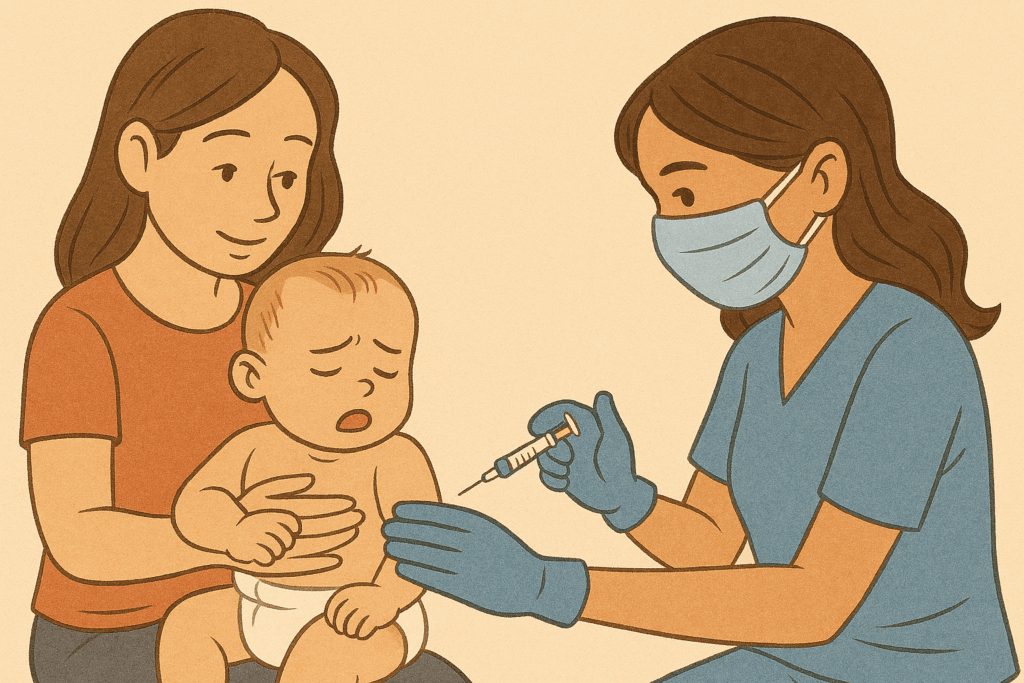
Following the recent American changes in childhood vaccination recommendations, Hepatitis Australia and ASHM have published a media release outlining the importance of hepatitis B vaccination at birth.
Birth-doses of the hepatitis B vaccine are safe, effective and necessary. In Australia, the hepatitis B vaccine has been offered for free to all babies, since 2000. “Currently, four hepatitis B vaccinations are recommended before six months of age, with the first being preferably within 24 hours of birth when medically stable. Protection against hepatitis B is almost always long-lasting, and the birth-dose is tolerated very well by newborn babies.”
You can download the full Hepatitis Australia and ASHM media release here >>
Or read it online here >>
You can also learn more at our hepatitis B and childhood vaccinations page >>
Click on the following links for related resources & next steps
- Hepatitis A & B vaccination schedule for adults
- NSW Immunisation Schedule
- Catch-up Vaccination Advice – NSW Health
- National Centre for Immunisation Research & Surveillance – Hepatitis B Factsheet
- Australian Immunisation Handbook – Hepatitis B

Tx! MAG #46 coming soon

Tx! MAG is our easy read comic book about people’s journeys with hepatitis B and C, using real life stories for inspiration. Tx! MAG #46 will be out soon so make sure you get your free copy by subscribing here or you can read the digital version of issue #46 here.

What is an antibody?

Antibodies are part of our body’s defence system. They are formed in response to anything foreign that gets into our bloodstream – such as viruses, bacteria, or vaccines.
What do antibodies do?
Antibodies “stick on” to anything foreign that they find. If a virus tries to enter a body cell, but has big globs of antibody hanging off it, the virus can be blocked from entering the cell. As well as sticking to viruses, some antibodies trigger inflammation around a cell, which can stop bacteria and viruses growing.
How do hep C antibody tests work?
Hep C antibody tests are used to see if a person has ever developed hep C antibodies. If your test comes back positive, it means that hep C antibodies were found. This means that you have had hep C at some time. But this test doesn’t tell you if you have hep C right now.
If you ever had hep C, you will get a positive antibody test, even if you no longer have hep C now. Some people can clear hep C without treatment. 1 in 4 people will clear hep C in the first 6 months of having it. Some people may have had their hep C cured but will still have hep C antibodies.
To find out if you have hep C now, you need to then get a PCR test. This test will tell your doctor if you have a current hep C infection.
Want to know more about hep C, tests and antibodies? Follow this link to Hepatitis NSW’s factsheet on hep C antibody testing.

Beyond the C
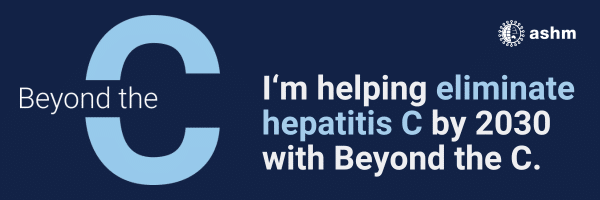
ASHM are very pleased to share that Beyond the C will continue to support primary care and enrol General Practice clinics until July 2026. Following the additional funding from the Australian Government Department of Health, Disability and Ageing, ASHM have successfully engaged 86 practices to date and continue to support the management of hepatitis C within primary care settings and efforts toward elimination by 2030!
Practice Support in 2025-2026
ASHM are eager to continue their collaboration with and support of services and aim to have 140 practices enrolled by end of June 2026.
More information can be found in the attached flyer about the program within your networks or reach out to ASHM’s project team (BeyondtheC@ashm.org.au) for more information.
ASHM have also developed a Supporter Kit that includes suggested wording and social media tiles to assist with promotion through your networks.

The Champion is our free monthly eNews with updates on hep C, hep B, treatment news, social media campaigns, living well with viral hepatitis, and events. To subscribe and receive a monthly edition of the The Champion to your inbox, please complete this confidential form:







